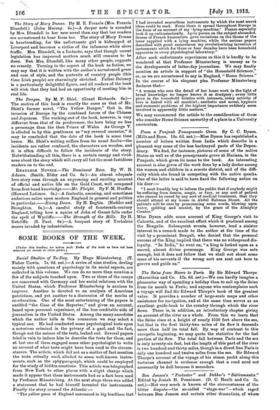SOME BOOKS OF THE WEEK.
finder this heading tee notice such Books of the week as hays not been restyled NT review in other forma.] Social Studies of To-Day. By Hugo Miinsterberg. (T. Fisher Unwin. 7s. 6d. net.)—A series of nine studies, dealing mainly with questions of psychology in its social aspects, are collected in this volume. We can do no more than mention a few of the subjects touched upon. Two or three of the essays are concerned with Germany and her social relations with the United States, which Professor Miinsterberg is anxious to improve. Another is devoted to an analysis of American patriotism, and yet another to a discussion of the merits of co-education. One of the most entertaining of the papers is entitled "the Case of the Reporter," and gives an account, based upon personal experience, of the less creditable side of journalism in the United States. Among the many anecdotes which the author tells in this connexion we may select a typical one. He bad conducted some psychological tests upon a notorious criminal in the privacy of a gaol, and the fact, though not the nature of the tests, leaked out. Several papers tried in vain to induce him to describe the tests for them, and at last one of them engaged some other psychologist to write an account of what tests might have been used in the circum- stances. The article, which did not as a matter of fact mention the tests actually used, alluded to some well-known instru- ments, such as the sphygmograph, which could be employed for the study of hidden emotions. This article was telegraphed from New York to other places with a slight change which made it appear that these instruments had as a fact been used by Professor Miinsterberg. At the next stage there was added a statement that he had himself invented the instruments. Finally the story crossed the Atlantic :— " The yellow press of England announced in big headlines that I had invented marvellous instruments by which the most secret ideas could be read. From there it spread throughout Europe in the form of an account of any 'lying-machine.' France especially took it up enthusiastically. Lyric poems on the subject abounded. Scores of French humourists gave variations on the theme of the lover supplied with a lying machine, while the serious papers described with great earnestness my revolutionizing invention of instruments which for three or four decades have been household apparatus in every physiological laboratory."
After such unfortunate experiences as this it is hardly to bo wondered at that Professor Miinsterberg is uneasy as to the developments of latter-day journalism. We may finally mention an article in support of "the Household Sciences," or, as we are accustomed to say in England, " Home Science." In the course of his eloquent plea Professor Miinsterberg declares that-
" A woman who sees the detail of her home work in the light of broad knowledge no longer knows it as drudgery; every little piece in the household bristles with interests, every activity of hers is linked with all mankind ; aesthetic and moral, hygienic and economic problems of the highest importance suddenly seem involved in apparently little matters."
We may recommend the article to the consideration of those who consider Home Science unworthy of a place in a University curriculum.










































 Previous page
Previous page